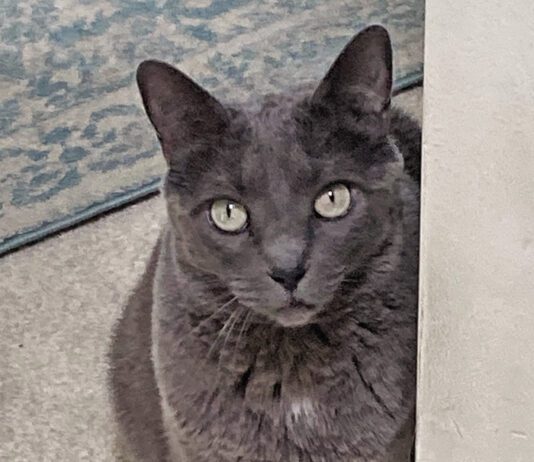Is it Normal Shedding or Hair Loss?
With the exception of hairless breeds such as the Sphynx, cats are known for their furry pelts, so if a cat starts to lose his coat, it’s justifiably cause for concern. How can you distinguish between normal shedding and abnormal hair loss? It’s easy: Shedding doesn’t cause bald spots. If the skin is visible, best to schedule a veterinarian exam or ask for a referral to a dermatologist. Hair loss, or alopecia, takes two main forms, says dermatologist William H. Miller, VMD, Medical Director of the Companion Animal Hospital at Cornell University College of Veterinary Medicine: “The hairs fall out spontaneously.” Though it’s a rare occurrence, spontaneous hair loss can be related to stress, endocrine diseases such as Cushing’s disease (an overproduction of cortisol by the adrenal glands), hyperthyroidism (excess production of the thyroid hormones), and some forms of cancer, including lymphoma, liver or pancreatic cancer.
Is Your Cat Afraid of Strange Noises?
Whenever cat owner Susan Lomond turns on her printer, her cat Sylvester dashes over to sit on it, lie on it and watch in fascination as the paper comes out. But when Susan’s friend Diana turns on her printer, her cat, Petra, flees in terror. Cats respond differently to noise depending on their personalities and experiences — and even their genetics. When cats get scared of noise, we often feel the need to soothe them. Actually, that may not be helpful. How to Help Your Cat. Cats differ from dogs when it comes to being frightened by noise. Dogs are notoriously afraid of thunder and fireworks, and will often try to escape from the house in a panic. Cats are more likely to be scared of unexpected noises around the house, such as the vacuum cleaner, construction work or a hair dryer. “But thunder and fireworks don’t seem to bother cats,” says Katherine A. Houpt, VMD, PhD, the emeritus James Law Professor of Animal Behavior at Cornell University’s College of Veterinary Medicine. “I have never seen fireworks or thunder phobia in cats,” she says.
Is Your Aging Cat Slowing Down?
At the age of 12, your cat seems to be slowing down a bit, and that could be perfectly normal. After all, a cat of her age — equivalent to the age of 65 or so in a human — has been living a full life and deserves to take it easy on herself. Nevertheless, it’s a good idea to have the animal checked out by your veterinarian. It’s quite possible that her diminished activity is a consequence not only of her advancing age, but of a debilitating pain in one or more of her joints.
Cats and Separation Anxiety
Vacations are wonderful, but there’s nothing like home sweet home. You drive home from the airport, excited at the thought of sleeping in your own bed, and seeing your beloved cat. And she does seem happy to see you at first, and you greet each other and cuddle several times. Then you go off to unpack …. and there she goes — right into your suitcase, urinating all over your folded clothes. To you, it may feel like your cat is angry because you left her — and this is the way she’s making her feelings known. But can a cat really hold a grudge?
Ask Elizabeth: June 2012
Aromatherapy, for readers who may not be acquainted with the term, is the practice of releasing the essences of various botanicals into the air for beneficial effects. Some essences are utilized as a form of alternative medicine and are said to ease pain, diminish inflammation, fight infection and reduce stress, among other things. Other essences are used, as is the case for you and your wife, for aesthetic purposes because they smell good. While the medicinal value of aromatherapy is debatable (and contested by some medical experts), there is no doubt that any household can get a pleasant boost from such delightful fragrances.
Cat Fights: What You Should Know
All kittens play, practicing to defend themselves by arching their backs, jumping on each other, chasing each other and maybe exchanging a few nips on the ears. “The difference between playing and fighting,” says Katherine A. Houpt, VMD, the emeritus James Law Professor of Animal Behavior at Cornell University’s College of Veterinary Medicine, “is that when playing, cats will take turns chasing each other. There isn’t one dominant aggressor or one main victim.” In general, however, cats don’t play much after 16 months of age, and males are more likely to engage in play of this kind. As for fighting, cats will fight at any age. “True fighting is usually more of a one-way process,” says Dr. Houpt. “One cat will be the aggressor and the other will be the victim. Hissing, clawing and batting with the paws are more fear directed than playful. The noisier the interaction, the more likely it’s a fight and not play.”
How to Curb Destructive Scratching
Just days after youve invested in new furniture, your cat decides she really loves it, too. Its the place shes chosen to give herself a pedicure, and soon the arms of that beautiful new sofa look like theyve gone through a shredder. You may notice your cat flexing her nails when she first gets up and stretches or suddenly stop to sink her nails into the wall-to-wall carpeting as she crosses a room. She may scratch at the end of a burst of energy after playing with her favorite toy. Fabrics, carpet, wood, cardboard - there are numerous materials in your house that can soon become a target for your cats clawing.
Ask Elizabeth: February 2012
Dear Elizabeth: Help! My cat Decker’s yowling is keeping me awake at night. I have become truly desperate for a good night’s sleep! - I can certainly sympathize with your need for sleep. Decker may be keeping you awake at night due to medical or behavioral reasons. Without more background information, I don’t know which is likely to be responsible in your case, so I’ll discuss several possibilities in the hopes that I hit upon the cause behind Decker’s insomnia. In the meantime, you should schedule an appointment with your veterinarian.
How Smart Is Your Cat?
Many people regard cats as being resourceful and self-reliant. After all, the species has survived thousands of years in radically different environments and living conditions. But how smart are our domestic cats? We humans tend to be very biased in assessing the intelligence of our cats (and dogs). That’s because we usually choose to judge them according to traits that we can relate to as human beings. When cats do something entertaining or display their independence, we generally think of them as intelligent.
Here, Kitty, Kitty: Will She Listen to You?
There’s a lighthearted saying that goes something like this: “Dogs come when called. Cats take a message and get back to you.” For anyone who has ever shared their home with both canine and feline friends, you know this statement is true! But it doesn’t have to be that way. You can use a training method like “clicker training” or “target training” to reward your cat when she performs a certain task. The clicker [an inexpensive, hand-held device that makes a distinct “clicking” sound] can tell a cat that she just did something her person liked and a treat is coming.
Do Cats Grieve: It Appears They Do
One of your beloved cats died several weeks ago, and you’ve been feeling pretty down. Friends who have been through the same experience tell you this is normal after such a loss. But then you notice that your other cat is eating less, and wanders around the house, yowling, as if he was looking for his lost companion. Do cats grieve like we do? And if so, how can we help them? There is now evidence that animals experience emotional responses to significant changes in their environment — and this includes going through the grieving process after the loss of feline or human companions.
Ask Elizabeth: December 2011
Dear Elizabeth: I have a five-year-old indoor cat, Baby, with whom I’ve shared my home ever since she was born. I’ve never had any other companion animals, so it’s been just Baby and me for all that time. Here’s my problem: I recently became engaged and at some point in the near future will be moving into my fiance’s home. He has two cats — both females. One is just about Baby’s age and the other is probably about seven years old. Neither one of them is very friendly. Naturally, I’m concerned about moving Baby into this new environment. I’m afraid that the animals will fight and hurt each other. I’ll appreciate any advice on how I can best address this dilemma.












